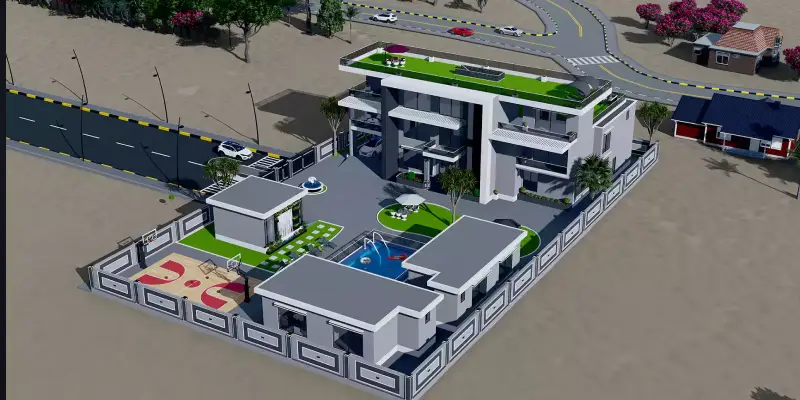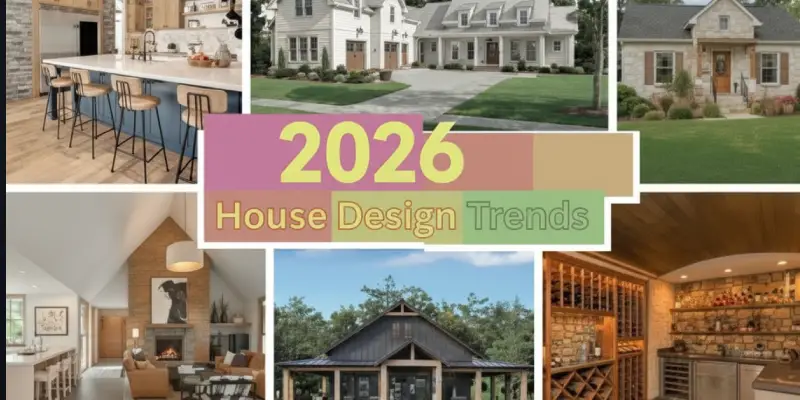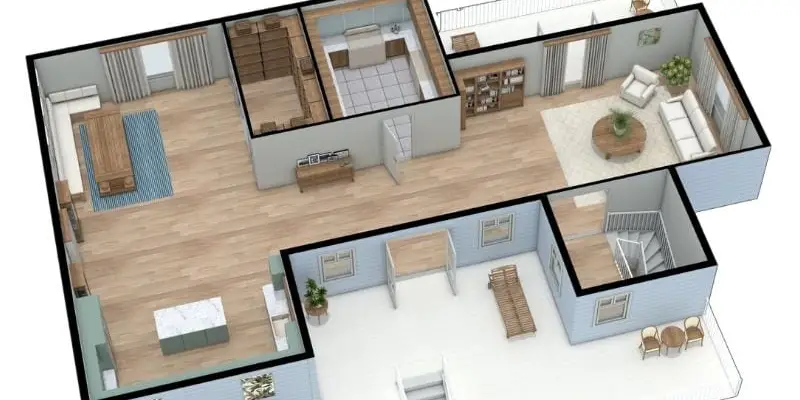Building a new home is one of the biggest decisions you’ll make in your lifetime. The perfect house design you choose today will shape how your family lives for years to come. But with so many options available, how do you pick the right one?
A well planned home not only looks great but also uses elements like quality flooring check options like Pabington Tiles for stylish interiors.
This information will help you make the best choice for finding the perfect house design for your family’s needs, lifestyle, and budget.

Table of Contents
ToggleUnderstanding Your Family’s Current and Future Needs
Before you start looking at beautiful house pictures online, take a step back. Think about who lives in your home and how they use the space. Understanding these basics is the first step toward finding the perfect house design.
Count Your Family Members
Start with the basics. How many people live in your house right now? Do you have young children who might need their own rooms as they grow up? Are elderly parents planning to move in with you in the future?
The perfect house design should work for your family today and five years from now.
Think About Daily Activities
Walk through a typical day in your current home. Where does your family spend most of their time? Do your children do homework at the kitchen table? Does your family watch TV together every evening? Do you like cooking big meals for guests?
These daily habits will help you decide which rooms need to be bigger and which ones can be smaller.
Consider Work and Study Needs
Many families now work and study from home. If you need a quiet office space or your children need a study area, make sure your house design includes these spaces.
Latest House Design Trends in Pakistan (2026)

The way we design homes has changed dramatically in the last few years. Understanding these trends helps you create the perfect house design that’s both modern and functional. Here are the newest trends shaping house designs across Pakistan:
1. Open Concept Living
Gone are the days of completely separated rooms. Modern Pakistani families are embracing open concept designs where the kitchen, dining, and living areas flow into each other. This is becoming a standard feature in the perfect house design.
Why it works
Parents can watch children while cooking. The space feels bigger. Family interaction increases.
Example
A 10 marla house with kitchen opening into the living room, separated only by a breakfast counter instead of a full wall. This creates 600+ square feet of connected living space that feels like a mansion.
2. Smart Home Integration
New house designs include provisions for smart technology, making them part of the perfect house design for modern families:
- Smart lighting controlled by phone
- Security cameras and doorbell systems
- Automated curtains and fans
- Central air conditioning controls
Real example
A DHA Lahore family built a 1 kanal house with pre wired smart home setup. Every room’s lights, fans, and AC units connect to their phones. They can control everything remotely, saving electricity bill when no one’s home.
3. Minimalist Exterior Design
Clean lines, simple shapes, and modern facades dominate 2026 designs. The “simple is beautiful” approach is replacing ornate, detailed exteriors, becoming a key element of the perfect house design.
What this looks like
Flat or slightly sloped roofs, large windows, minimal decorative elements, neutral colors (greys, whites, beiges), and clean geometry.
Cost benefit
Simpler designs cost 15-20% less to build than traditional designs with lots of decorative elements.
4. Indoor Outdoor Connection
Modern designs blur the line between inside and outside:
- Large sliding glass doors opening to gardens or terraces
- Covered outdoor sitting areas (pergolas)
- Balconies and terraces as extensions of living spaces
- Green walls and planters integrated into design
Example
A Bahria Town Islamabad house with living room opening to a covered terrace. The family uses this space 8-9 months a year for morning tea, evening gatherings, and casual dining.
5. Multi Functional Spaces
With land prices increasing, every square foot needs to work harder in the perfect house design:
- Study rooms that convert to guest bedrooms
- Living rooms with storage integrated furniture
- Under stair storage and utility spaces
- Mezzanine floors for additional usable area
Example
A 5 marla house in Johar Town with a mezzanine level between ground and first floor, creating an extra 150 square feet for a home office without using valuable plot space.
6. Sustainable and Eco Friendly Features
Energy costs keep rising, making sustainable design features part of the perfect house design:
- Solar panel ready roofs
- Rainwater harvesting systems
- Cross ventilation for natural cooling
- Energy efficient windows and insulation
- LED lighting throughout
Example
A family in Model Town installed solar panels on their roof, cutting electricity bills by 70%. The initial investment of Rs. 4-5 lakhs paid for itself in 3 years.
7. Neutral Color Palettes
2026 designs favor neutral, calming colors:
- Whites, greys, and beiges for walls
- Natural wood tones for accents
- Pops of color through furniture and decoration
- Easy to repaint and refresh
Why
Neutral backgrounds make spaces feel bigger, brighter, and more modern. You can change the look by changing accessories instead of repainting entire rooms.
Choosing the Right Number of Bedrooms
The number of bedrooms is usually the first thing people think about when choosing the perfect house design for their family.
The Basic Rule
Each child should have their own bedroom by the time they turn 10. If you have a baby, they can share your room for the first few years, but plan for their own space later.
Guest Room Considerations
If you have relatives who visit often or live far away, a guest room can be very useful. But if space is tight, a study room that can double as a guest room works well too.
Master Bedroom Size
Your main bedroom should be large enough for your bed, wardrobe, and a small seating area if possible. A connected bathroom makes daily routines much easier.
Modern trend
Master suites are getting bigger, often 250-300 square feet including attached bathroom and dressing area. This creates a private retreat within the home.
Planning Your Living Spaces
Kitchen Design Choices
The kitchen is the heart of most homes. Think about how you cook and eat as a family.
If you cook elaborate meals or bake often, you need more counter space and storage. If you eat out frequently, a smaller kitchen with basic facilities might work fine.
An open kitchen that connects to the living room helps parents keep an eye on children while cooking. But if you cook with lots of spices or frying, a separate kitchen prevents smells from spreading.
2026 Kitchen Trends
- Kitchen islands with seating (breakfast counter)
- Pull-out pantries and corner storage solutions
- Granite or quartz countertops (easy to clean)
- Chimney/exhaust hood (standard in modern kitchens)
- Dedicated space for microwave, oven, and refrigerator
Living Room Layout
Your living room should be big enough for your whole family to sit together comfortably. If you entertain guests often, make sure there is enough seating space.
Consider where you will put your TV, sofa, and other furniture before finalizing the room size.
Modern living room features:
- TV wall with built-in shelving
- Recessed ceiling with indirect lighting
- Large windows for natural light
- Connection to outdoor terrace or balcony
Dining Space Decisions
Some families eat all their meals together at a dining table. Others prefer casual eating in the kitchen or living room. Choose your dining space size based on your family’s eating habits.
Current trend
Formal dining rooms are disappearing. Families prefer either open dining areas connected to the kitchen or casual dining at kitchen islands.
Popular House Design Examples for Different Plot Sizes

Let me show you real, practical designs that work for different plot sizes. These examples will help you visualize the perfect house design for your specific plot:
3 Marla House Design (675 sq ft plot)
Best for
Small nuclear families (3-4 people), first-time homeowners, limited budgets. This compact perfect house design maximizes every square foot.
Typical Layout
Ground Floor (approximately 400 sq ft built up)
- Small living/dining area (12×15 feet) combined space
- Kitchen (8×10 feet) compact but functional
- Powder room (4×5 feet) guest toilet
- Parking space in front
First Floor (approximately 400 sq ft built up)
- Master bedroom (12×12 feet) with attached bathroom
- Second bedroom (10×11 feet)
- Common bathroom
Total Built up
800 sq ft across two floors
Design Tips
- Use vertical space with double-story design
- Built-in storage maximizes space
- Light colors make rooms feel larger
- Large windows bring in natural light
Cost Estimate
Rs. 30-45 lakhs (construction only)
Real Example
A young couple in Wapda Town built this exact layout. They designed the ground floor living area to open into a small back courtyard (8×10 feet), adding valuable outdoor space.
5 Marla House Design (1125 sq ft plot)
Best for
Medium families (4-5 people), most common plot size in Pakistan. This is often considered the perfect house design for average Pakistani families.
Typical Layout
Ground Floor (approximately 600 sq ft built up)
- Living room (15×18 feet)
- Dining area (10×12 feet)
- Kitchen (10×12 feet) can be open or separate
- Guest bedroom/study (10×11 feet)
- Powder room
- Parking area
First Floor (approximately 600 sq ft built up)
- Master bedroom (14×16 feet) with attached bathroom and dressing
- Two additional bedrooms (11×12 feet each)
- Common bathroom
- Small terrace or balcony
Total Built up
1200 sq ft across two floors
Design Tips
- Staircase placement is crucial avoid wasting space
- Consider a small servant quarter or storage room at back
- Terrace can be partially covered for outdoor sitting
- Plan for future addition of third floor if needed
Cost Estimate
Rs. 50-75 lakhs (construction only)
Real Example
A family in Township built a 5 marla house with an open concept ground floor. Their kitchen opens into the dining and living areas, creating a 400+ sq ft entertaining space. The family loves how spacious it feels.
10 Marla House Design (2250 sq ft plot)
Best for
Large families (6-8 people), comfortable middle class living, home offices needed. This spacious perfect house design offers room for growth.
Typical Layout
Ground Floor (approximately 1000 sq ft built up)
- Large living room (18×20 feet)
- Formal dining room (12×14 feet) optional
- Modern kitchen (12×14 feet) with breakfast counter
- Guest bedroom with attached bathroom
- Powder room
- Home office or study room
- TV lounge or family room (optional)
- Double car parking
First Floor (approximately 1000 sq ft built up)
- Master bedroom suite (16×18 feet) with attached bathroom, dressing area
- Three additional bedrooms (12×14 feet each)
- Two or three bathrooms
- Family sitting area or TV lounge
- Large terrace or balconies
Total Built up
2000 sq ft across two floors
Design Tips
- Ground floor can include separate guest/family entrances
- Home office with separate entrance becoming common
- Large terrace on first floor for outdoor gatherings
- Plan for servant quarter, storage room, and utility areas
Cost Estimate
Rs. 1-1.5 crore (construction only)
Real Example
A doctor in Model Town designed his 10 marla house with a separate entrance for a ground floor clinic/office. This allows patients to visit without entering family areas. The design includes 4 bedrooms upstairs for his family of 6.
1 Kanal House Design (4500 sq ft plot)
Best for
Large or joint families, those wanting luxury and space, businesses needing home offices. This luxurious perfect house design provides ultimate comfort.
Typical Layout
Ground Floor (approximately 2000 sq ft built up)
- Grand entrance lobby/hall
- Large drawing room (20×22 feet) for formal guests
- Family living room (18×20 feet)
- Formal dining room (14×16 feet)
- Large modern kitchen (14×16 feet)
- Breakfast area
- Guest bedroom suite with attached bathroom
- Home office or study
- Powder room
- Store room
- Servant quarter with bathroom
- Double car parking + covered porch
First Floor (approximately 2000 sq ft built up)
- Master bedroom suite (18×20 feet) with large attached bathroom, walk-in closet, private balcony
- Four additional bedrooms (14×16 feet each) all with attached bathrooms
- Family TV lounge or sitting area
- Large terrace partially covered for outdoor sitting
- Laundry room
Total Built up
4000 sq ft across two floors
Design Tips
- Elegant staircase as focal point
- High ceilings (11-12 feet) on ground floor
- Separate formal and family areas
- Large windows and doors for natural light
- Consider basement for additional space (gym, entertainment room)
- Plan for generator room and water filtration system
Cost Estimate
Rs. 2.5-4 crore (construction only)
Real Example
A business family in DHA built a 1 kanal house with the ground floor designed for frequent entertaining. Their drawing room, dining room, and a beautiful courtyard with fountain create an impressive space for hosting 50+ guests. Upstairs remains private family space.
Selecting the Right Plot Size and House Style
Finding the perfect house design starts with understanding your plot and choosing the right architectural style:
Single Story vs Double Story
Single story homes are easier for elderly family members and young children. Everything is on one level, so there are no stairs to worry about.
However, single story designs work only on larger plots (10 marla+). On small plots, you’d waste too much space.
Double story homes give you more space on a smaller plot. They also offer better privacy, with bedrooms upstairs and living areas downstairs.
2026 trend
Triple story designs are becoming common in Lahore, especially on 3-5 marla plots. Ground floor for living/kitchen, first floor for bedrooms, second floor for additional rooms or roof terrace.
Plot Size Considerations
A bigger plot gives you space for a garden, parking, and future additions. But it also costs more and requires more maintenance.
Think about what outdoor activities your family enjoys. Do your children need space to play? Do you want to grow plants or have outdoor gatherings?
Modern House Styles in Pakistan
Choosing the right architectural style is crucial for the perfect house design:
Contemporary Modern
- Clean lines and geometric shapes
- Large windows and glass doors
- Flat or low slope roofs
- Neutral color palettes
- Minimal exterior decoration
- Popular in: DHA, Bahria Town, upscale societies
Traditional Pakistani
- Jharokas (bay windows)
- Arched doorways and windows
- Decorative exterior elements
- Sloped tile roofs
- Warm colors (beiges, browns)
- Popular in: Established neighborhoods, heritage areas
Modern Traditional Fusion
- Contemporary structure with traditional accents
- Combination of modern and classic elements
- Best of both worlds
- Popular in: Most middle class areas
Minimalist Modern
- “Less is more” philosophy
- Extremely simple, clean design
- Maximum functionality
- Neutral colors throughout
- Popular in: Urban professional homes
Budget Friendly Design Decisions
Creating the perfect house design doesn’t mean you need unlimited funds. Smart decisions help you maximize value:
Prioritize Essential Rooms
Not every room needs to be large. Make your most used rooms bigger and keep less important spaces smaller.
For example, if your family rarely uses a formal dining room, make it smaller and use that space to make your kitchen or living room bigger.
Plan for Phased Construction
You can build your house in phases. Start with essential rooms and add extra spaces like a study room, guest room, or covered parking later when your budget allows.
Example
Build ground floor completely, but finish only 2 bedrooms on first floor initially. Complete remaining bedrooms next year.
Simple Designs Cost Less
Houses with simple, rectangular shapes cost less to build than houses with many corners and complex rooflines. Choose a straightforward perfect house design and add personality with interior decoration instead.
Cost difference
A complex design with multiple corners, levels, and roof types can cost 20-30% more than a simple rectangular design of the same size.
Smart Material Choices
Where to save
- Use standard tile sizes (2×2 feet) instead of imported tiles
- Pakistani brand bathroom fixtures instead of imported
- Standard windows instead of custom sizes
- Paint instead of wallpaper for walls
Where to invest
- Good quality structure (bricks, cement, steel)
- Proper waterproofing
- Quality electrical wiring
- Plumbing pipes and fixtures
Climate and Weather Considerations
Pakistan’s climate varies greatly, so the perfect house design must account for local weather conditions:
Sun and Shade Planning
Think about where the sun rises and sets on your plot. Bedrooms should get morning sunlight but stay cool in the afternoon. Living areas can handle more sunlight throughout the day.
Practical example
In Lahore, where summers are brutal, position main bedrooms and living areas facing north or east. Avoid west facing bedrooms they become unbearably hot by afternoon.
Ventilation Needs
Good airflow keeps your house comfortable and reduces electricity bills. Make sure your design includes windows on opposite walls in each room for cross ventilation.
Modern solution
Many 2026 designs include ventilation towers or ceiling vents that push hot air up and out naturally.
Rain Protection
Your house design should protect against heavy rains. This includes proper roof slopes, waterproofing, and covered entrances.
Critical areas needing waterproofing
- Roof and terrace surfaces
- Bathroom walls and floors
- Kitchen walls behind sink
- Basement (if any)
- External walls up to 4-5 feet height
Storage and Organization
Built in Storage Solutions
Every room needs storage space. Plan for wardrobes in bedrooms, cabinets in the kitchen, and storage areas for household items.
Built in storage looks neater and uses space more efficiently than buying furniture later.
Modern built in ideas:
- Walk in closets in master bedroom
- Under stair storage space
- Kitchen pantry with pull out shelves
- Window seats with storage underneath
- Mezzanine storage areas
Utility Areas
You need space for washing machines, water tanks, generators, electric water geyser and other utility items. Plan these areas from the beginning rather than trying to fit them in later.
Essential utility spaces
- Laundry area (separate room or portion of terrace)
- Generator room with proper ventilation
- Water tank platform (usually on roof)
- Store room for seasonal items
- Space for water pump and filtration system
Safety and Security Features
Child Safety
If you have young children, avoid designs with sharp corners, open staircases, or balconies without proper railings.
Child safe design elements
- Smooth, rounded corners on built-in furniture
- Staircase with proper railings and narrow gaps
- Balcony railings high enough (minimum 42 inches)
- Window grills on upper floors
- Safety gates at staircase entrance
Security Planning
Your house design should allow you to see who is at your gate from inside the house. Consider where you will place security cameras and ensure good lighting around entrances.
2026 security features
- Smart doorbells with camera and intercom
- CCTV camera provisions at main entrance, parking, and back area
- Motion sensor lights around property
- Strong main gate with electric lock
- Boundary wall height (8-10 feet minimum)
Emergency Access
Make sure your house has at least two exits in case of emergencies. Windows should be large enough for emergency exit if needed.
Working with Professionals
Finding the Right Team
Choosing the perfect house design is easier when you work with experienced professionals. Architects in Lahore can help you create the perfect house design that fits your plot, budget, and family needs perfectly.
Look for a construction company in Lahore that has experience building homes similar to what you want. Check their previous projects and talk to their past clients.
Communication is Key
Be clear about your needs, budget, and timeline from the beginning. Good professionals will listen to your requirements and suggest practical solutions.
Don’t be afraid to ask questions or request changes to the design. It’s much easier to make changes on paper than after construction starts.
What to Ask Your Architect/Builder
Important questions
- Can you show me similar projects you’ve completed?
- What’s included in your design and construction cost?
- How long will the project take?
- Who handles municipal approvals and NOC?
- What warranty do you provide on construction?
- How do you handle cost overruns or delays?
- Can I make changes during construction?
- What materials and brands do you use?
Why Choose RSM Home and Developers
At RSM Home and Developers, we understand that every family is unique. With over 17 years of experience in construction, we help families create homes that fit their specific needs and budgets.
Our team includes experienced architects in Lahore, engineers, and interior designers who work together to bring your vision to life. We handle everything from initial design to final handover, making the process smooth and stress-free for you.
What Sets Us Apart
Experience That Matters
17+ years building homes across Lahore means we’ve seen every challenge and know how to solve it.
Complete In House Team
Our architects, engineers, construction managers, and interior designers work together under one roof. No coordination issues between different contractors.
Transparent Pricing
We provide detailed, itemized quotes. No hidden charges or surprise costs during construction.
Quality Construction
We use quality materials and experienced labor. Our construction supervisor visits your site daily to ensure standards are maintained.
Ongoing Support
Even after handover, we’re available for any issues or questions. Your satisfaction is our reputation.
Proven Track Record
Visit our completed projects across Lahore. Talk to our clients. See the quality for yourself.
Our Design Process
- Initial Consultation: Free meeting to understand your needs and budget
- Site Visit: We visit your plot to assess conditions
- Preliminary Design: Initial sketches showing layout options
- Design Refinement: Make changes until you’re completely happy
- Final Drawings: Complete architectural, structural, and electrical drawings
- Construction: Professional execution with regular updates
- Handover: Complete inspection and documentation
We offer transparent pricing, quality construction, and ongoing support to ensure your new home serves your family well for years to come.
Making Your Final Decision
Create a Priority List
Write down what matters most to your family. Is it having a big kitchen? Separate bedrooms for each child? A home office? A garden space?
Use this list to evaluate different design options and choose the perfect house design that meets your top priorities.
Think Long term
The perfect house design should work for your family for at least 10-15 years. Consider how your needs might change as children grow up, family members age, or your work situation changes.
Future-proofing questions
- Will I need more bedrooms as children grow?
- Might elderly parents move in?
- Could I work from home in the future?
- Will I need space for married children visiting?
- Am I planning to expand the family?
Get Multiple Opinions
Show your preferred design to family members and trusted friends. They might notice things you missed or suggest improvements.
But remember
Too many opinions can confuse you. Listen to feedback from people who know your family well, then trust your judgment.
Trust Your Instincts
After considering all the practical factors, choose the design that feels right for your family. You will be living in this house for years, so it should make you happy every time you come home.
Conclusion
Choosing the perfect house design for your family takes time and careful thought. Consider your family’s current needs, future plans, budget, and lifestyle preferences when selecting the perfect house design.
The latest design trends in 2026 offer exciting possibilities open concept living, smart home features, sustainable elements, and beautiful minimalist aesthetics. But trends should inspire you, not dictate your choices. The perfect house design is the one that works for YOUR family.
Work with experienced professionals like RSM Home and Developers who can guide you through the process and help you avoid common mistakes. Remember that finding the perfect house design is about making your daily life easier and more enjoyable.
Take your time with this decision. Look at real examples similar to your plot size. Visit completed homes if possible. Imagine your family’s daily routine in each perfect house design option.
A well planned perfect house design will serve your family well for decades to come, making it one of the best investments you will ever make.
Ready to start designing your dream home? Contact RSM Home and Developers today. With our 17+ years of experience and dedicated team of architects in Lahore, we’ll help you create the perfect house design for your family.
FAQs
Q1: What is the perfect house design for a family of 4-5 people?
A 5 marla double story house with 3 bedrooms, open-concept living/dining/kitchen, and 2 bathrooms is the perfect house design for average Pakistani families of 4-5 members.
Q2: How much does it cost to build the perfect house design in Lahore?
Construction costs range from Rs. 30-45 lakhs for 3 marla, Rs. 50-75 lakhs for 5 marla, and Rs. 1-1.5 crore for 10 marla plots depending on finishes and materials.
Q3: Should I choose a single story or double story perfect house design?
Double story designs work better for plots under 10 marla to maximize space, while single story suits larger plots and families with elderly members or young children.
Q4: What are the latest trends in perfect house design for 2026?
Open concept living, smart home integration, minimalist exteriors, indoor outdoor connections, multi functional spaces, and sustainable features define the perfect house design in 2026.
Q5: How many bedrooms should the perfect house design include?
Plan one bedroom per child (by age 10), plus master bedroom, and optionally a guest room or study that doubles as guest space if budget allows.
Q6: What room size is ideal for the perfect house design?
Master bedrooms should be 14×16 feet minimum, other bedrooms 11×12 feet, living rooms 15×18 feet for 5 marla and larger for bigger plots.
Q7: How do I choose between open kitchen and separate kitchen in my perfect house design?
Choose open kitchen for modern living and family interaction, but opt for separate if you cook with heavy spices, frying, or prefer traditional cooking styles.
Q8: What’s the most cost effective perfect house design?
Simple rectangular designs with minimal corners, standard materials, open-concept layouts, and phased construction offer the most cost-effective perfect house design approach.
Q9: How important is climate consideration in perfect house design?
Very important proper sun orientation, cross-ventilation, waterproofing, and shading can reduce electricity bills by 30-40% and dramatically improve comfort in Pakistan’s climate.
Q10: Should the perfect house design include a home office?
Yes, with remote work increasing, a dedicated home office or multi functional study/guest room is now essential in the perfect house design for modern families.
Q11: What storage solutions work best in perfect house design?
Built in wardrobes, under-stair storage, kitchen pantries, walk in closets, and dedicated utility rooms maximize space efficiency in the perfect house design.
Q12: How do I ensure my perfect house design is child-safe?
Include smooth corners, proper staircase railings (42+ inches), balcony grills, window safety bars on upper floors, and safety gates at staircase entrances.
Q13: What’s the ideal plot size for the perfect house design?
5 marla (1125 sq ft) is ideal for average families, offering enough space for comfortable 3 bedroom double story perfect house design with parking and small outdoor area.
Q14: Should I hire an architect for my perfect house design?
Yes, experienced architects ensure proper space utilization, structural safety, municipal approvals, and cost effective solutions, making your investment worthwhile for the perfect house design.
Q15: How long does it take to finalize the perfect house design?
From initial consultation to final approved drawings, expect 3-6 weeks for the perfect house design development including revisions and municipal approval processes.
RSM Home and Developers Building dreams, creating homes. Expert architects and construction company in Lahore serving families across Pakistan since 2007.




